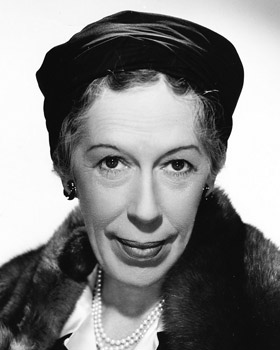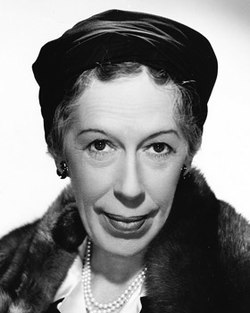Top Qs
Timeline
Chat
Perspective
Edna May Oliver
American actress (1883–1942) From Wikipedia, the free encyclopedia
Remove ads
Edna May Oliver (née Nutter, November 9, 1883 – November 9, 1942) was an American stage and film actress. During the 1930s, she was one of the better-known character actresses in American films, often playing tart-tongued spinsters.
Remove ads
Career
Summarize
Perspective
Born in Malden, Massachusetts, the daughter of Ida May and Charles Edward Nutter, Oliver quit school at age 14 to pursue a stage career.
She achieved her first success in 1917 on Broadway in Jerome Kern's musical comedy Oh, Boy!, playing the hero's comically dour Aunt Penelope.[1] In 1923 she appeared as Hannah in the Broadway version of Owen Davis's Icebound. She would later reprise the Hannah role in William C. De Mille's silent film of Icebound the following year. In 1925, Oliver appeared on Broadway in The Cradle Snatchers, costarring Mary Boland, Gene Raymond, and Humphrey Bogart.[2] Oliver's most notable stage appearance was as Parthy, wife of Cap'n Andy Hawks, in the original 1927 stage production of the musical Show Boat.[3] She reprised her role in the 1932 Broadway revival,[4] but turned down the chance to play Parthy in the 1936 film version to play the Nurse in that year's film version of Romeo and Juliet.
Her film debut was in 1923 in Wife in Name Only.[5] She continued to appear in films until Lydia in 1941. She first gained major notice in films for her appearances in several comedies starring the team of Wheeler & Woolsey, including Half Shot at Sunrise, her first film under her RKO Radio Pictures contract in 1930. Usually in featured parts, she starred in ten films, including Fanny Foley Herself (1931) and Ladies of the Jury (1932). She played wealthy, domineering Aunt March in the 1933 version of Little Women.


Oliver's most popular star vehicles were mystery-comedies, starring as spinster sleuth Hildegarde Withers from the popular Stuart Palmer novels. The series ended prematurely when she left RKO to sign with Metro-Goldwyn-Mayer in 1935; the studio attempted to continue the series with Helen Broderick and then ZaSu Pitts as Withers.[6]
While at MGM, David O. Selznick cast Oliver in two film versions of novels by Charles Dickens, as the prim, acidic Miss Pross, in A Tale of Two Cities[7] (1935), starring Ronald Colman, and as the title character's eccentric aunt, Betsy Trotwood, in David Copperfield[8] (also 1935).
She appeared in the Shirley Temple film Little Miss Broadway (1938) as the landlord of a hotel for vaudevillians who wants to shut it down. She also performed in two 1939 movie musicals: with Tyrone Power in the Sonja Henie skating film Second Fiddle,[9] and in a supporting role as the agent of the title characters in the Fred Astaire/Ginger Rogers musical The Story of Vernon and Irene Castle.[10] A 1940 comic performance as Laurence Olivier's Mr. Darcy's domineering aunt Lady Catherine de Bourgh in Pride and Prejudice[11] and a 1941 role as Merle Oberon's grandmother in Lydia[12] concluded her film career.
She was also cast in noncomedic films such as Cimarron[13] (1931), Ann Vickers[14] (1933), and Romeo and Juliet[15] (1936).
Remove ads
Death
Oliver died at Cedars of Lebanon Hospital (today Cedars-Sinai Medical Center) on her 59th birthday in 1942 shortly after being diagnosed with abdominal cancer, and was interred in the Forest Lawn Memorial Park Cemetery in Glendale, California.[16]
Awards and honors
Oliver received an Oscar nomination for Best Supporting Actress for her performance in Drums Along the Mohawk (1939).[17]
Stage
Summarize
Perspective
(This list is limited to New York/Broadway theatrical productions.)
Remove ads
Filmography
Remove ads
Radio
Oliver was a regular cast member from 1941 to 1942 on the Bob Burns series The Arkansas Traveler. She often played the character of an off-beat nurse, the type of role she had already performed earlier during her movie career.[71]
On July 7, 1942 Oliver started a new summer radio series titled The Remarkable Miss Tuttle.[72] She played the lead role of Josephine Tuttle, and the program had a planned 13-week run. However, Oliver quickly became ill and her role was taken over by her friend Mary Boland.[73] When it became apparent that Oliver could not return, the title of the program was changed to The Remarkable Miss Crandall, with Boland playing the new lead character. This new format only lasted two weeks, and for the remaining four weeks the program was replaced by a new series, Mayor of the Town, starring Lionel Barrymore.[74]
Remove ads
References
Bibliography
Further reading
External links
Wikiwand - on
Seamless Wikipedia browsing. On steroids.
Remove ads

